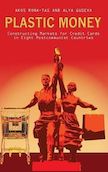
Author – By: Alya Guseva, Akos Rona-Tas
In the United States, we now take our ability to pay with plastic for granted. In other parts of the world, however, the establishment of a “credit-card economy” has not been easy. In countries without a history of economic stability, how can banks decide who should be given a credit card? How do markets convince people to use cards, make their transactions visible to authorities, assume the potential risk of fraud, and pay to use their own money? Why should merchants agree to pay extra if customers use cards instead of cash?
In Plastic Money, Akos Rona-Tas and Alya Guseva tell the story of how banks overcame these and other quandaries as they constructed markets for credit cards in eight postcommunist countries. We know how markets work once they are built, but this book develops a unique framework for understanding how markets are engineered from the ground up-by selecting key players, ensuring cooperation, and providing conditions for the valuation of a product. Drawing on extensive interviews and fieldwork, the authors chronicle how banks overcame these hurdles and generated a desire for their new product in the midst of a transition from communism to capitalism.
Industry Reviews
“Akos Rona-Tas and Alya Guseva’s empirical research on the spread of payment and credit cards into post-communist economies is highly original and breaks new ground. They adroitly engage a number of important questions about globalization, the emergence of a consumer society, market creation, and the transition from a command to a market economy. A well-written and lively book.” – Bruce Carruthers, Northwestern University “This book represents a peak achievement of two of the best economic sociologists around. Their insight into the development of credit and debit card markets in eight transitional economies is result is an astoundingly fine empirical study.” – Richard Swedberg, Cornell University “With verve and compelling evidence, Alya Guseva and Akos Rona-Tas guide us into the intricate world of credit and debit cards in eight post-communist countries. Along the way, Plastic Money boldly demolishes myths about how markets, money, and globalization work. An inspired contribution to economic sociology.” – Viviana A. Zelizer, Author of Economic Lives: How Culture Shapes the Economy “Plastic Money is a fascinating study of the creation of new markets. Investigating the emergence of credit cards in eight former socialist countries, Guseva and Rona-Tas show how the social, cultural, technological, and legal infrastructure was built in the process of transition. Their account is an important theoretical and empirical contribution to our sociological understanding.” – Jens Beckert, Director of the Max Planck Institute for the Study of Societies